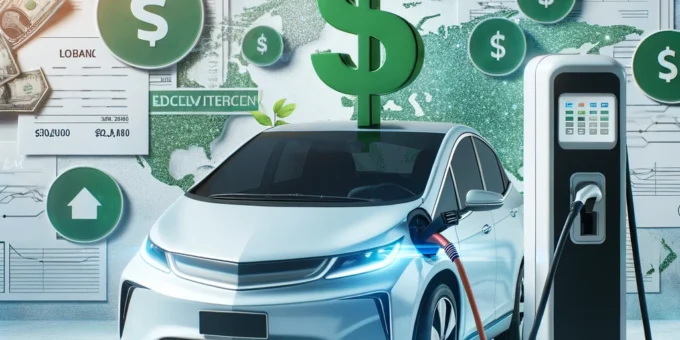
Electric vehicles (EVs) are revolutionizing transportation, offering lower fuel costs, reduced carbon emissions, and advanced technology. However, the upfront cost of an EV can be a challenge. That’s where EV loans and incentives come in—making it easier and more affordable to own a sustainable vehicle.
Whether you’re looking for low-interest auto loans, government incentives, or special financing offers, this guide will help you find the best EV financing options to drive electric for less.
Why Consider an EV Loan?
Lower Monthly Payments
EV loans spread out the upfront cost of an electric vehicle, making ownership more manageable without a large cash payment.
Competitive Interest Rates
Banks, credit unions, and manufacturers offer special low-interest rates on EV-specific auto loans to encourage green energy adoption.
Government Incentives
You can save thousands through federal tax credits, state rebates, and local incentives, which significantly reduce your financing costs.
Minimal Maintenance & Fuel Costs
With no gas expenses and fewer moving parts, EVs save you money over time, making loan payments more affordable.
Best EV Loan & Financing Options
1. Green Auto Loans – Low Rates for Electric Vehicles
Green auto loans are exclusive financing options that offer lower interest rates for buyers of electric or hybrid cars.
Top Green Auto Loan Providers:
| Lender | Interest Rate (APR) | Loan Terms | Benefits |
|---|---|---|---|
| LightStream | 5.99% – 9.99% | 24 – 84 months | No restrictions on vehicle type |
| Bank of America | 4.99% – 8.99% | 36 – 72 months | Special rates for EVs |
| Federal Credit Unions | 3.99% – 7.49% | 36 – 84 months | No or low fees |
💡 Tip: Many lenders offer rate discounts when you set up autopay or go paperless!
2. Manufacturer Financing & Special EV Deals
Many EV manufacturers offer low-interest financing, cashback incentives, or lease deals to make their vehicles more affordable.
Best EV Manufacturer Financing Offers:
| Manufacturer | Financing Offer | Loan Term | Extra Incentives |
|---|---|---|---|
| Tesla | 3.99% APR | Up to 72 months | $7,500 federal tax credit |
| Nissan | 0% APR for 36 months | 24 – 72 months | Lease deals on Nissan Leaf |
| Ford | 1.9% APR | 36 – 60 months | Rebates on Mustang Mach-E |
🚗 Pro Tip: Dealer financing may include hidden fees—always compare offers with bank or credit union loans!
3. Credit Union Loans – Lower Rates & Flexible Terms
Credit unions typically offer better interest rates and longer loan terms than traditional banks.
Best Credit Unions for EV Loans:
| Credit Union | Interest Rate | Loan Terms | Key Perks |
|---|---|---|---|
| Navy Federal | 3.49% APR | 36 – 84 months | No application fees |
| PenFed | 2.99% APR | Up to 96 months | Green vehicle discounts |
| Alliant | 3.74% APR | 36 – 84 months | Cash-back rewards |
🏦 Tip: Many credit unions allow non-members to join with a small deposit!
4. Federal & State EV Incentives
The U.S. government offers a $7,500 federal tax credit for qualifying EVs. Additionally, many states offer extra incentives to cut costs even further.
Top State EV Incentives:
| State | Rebate Amount | Eligibility |
|---|---|---|
| California | Up to $7,500 | Extra savings for low-income buyers |
| New York | $2,000 | EVs under $60,000 |
| Colorado | $5,000 | Applies to new and leased EVs |
🌱 Tip: Many utility companies offer rebates for home EV chargers, so check for extra savings!
5. Should You Lease or Finance an EV?
Leasing an EV allows you to drive a new model every few years, while financing provides full ownership.
Pros & Cons of Leasing vs. Financing an EV:
| Factor | Leasing | Financing |
|---|---|---|
| Monthly Payment | Lower | Higher |
| Ownership | No | Yes |
| Mileage Limits | Yes | No |
| Upgrade Options | Every 2-3 years | Must sell/trade-in |
⚡ Best for frequent upgraders: Leasing lets you switch to newer EV models every few years!